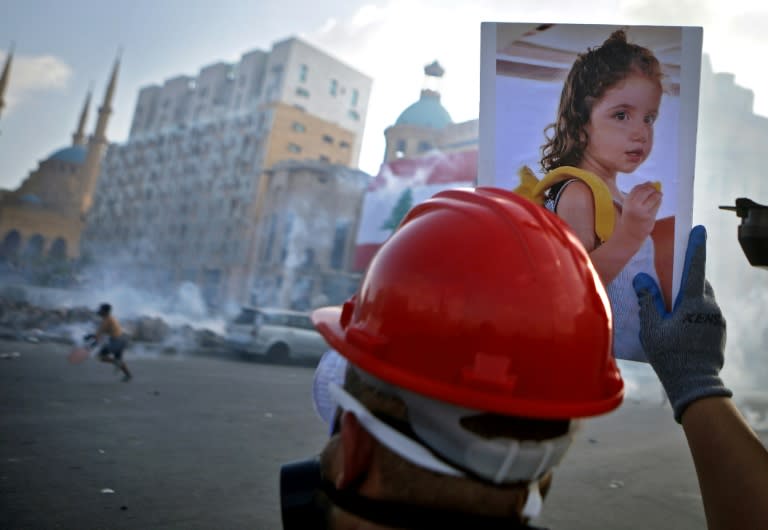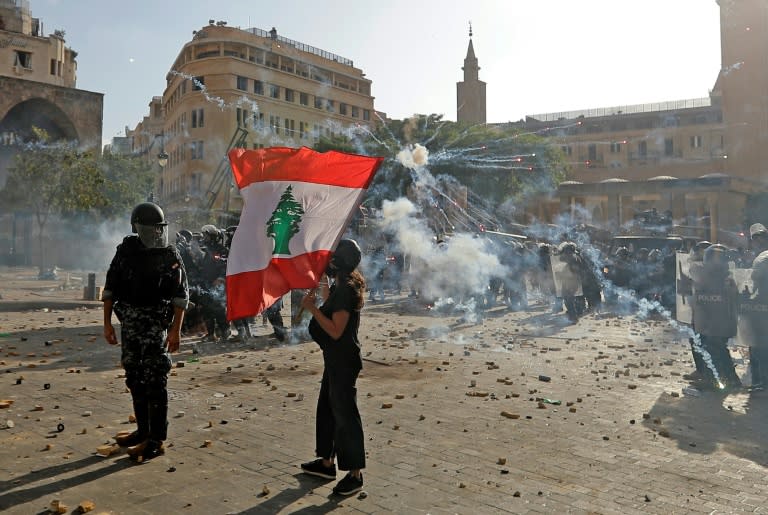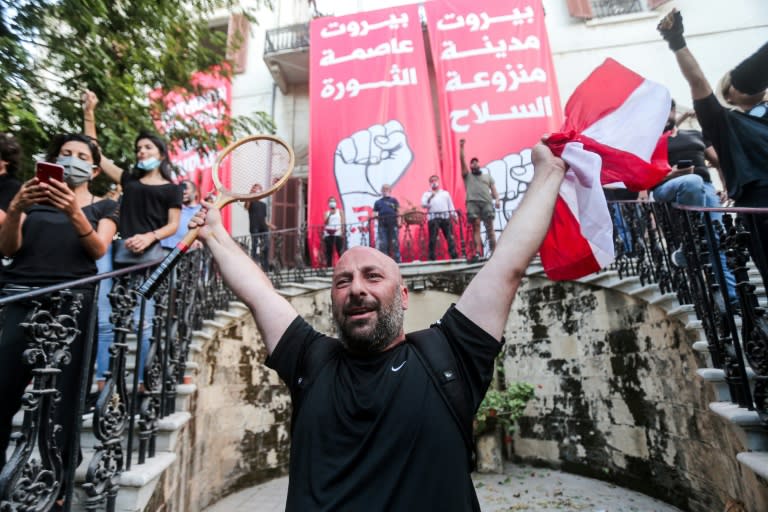by AFP — Layal Abou Rahal and Tony Gamal-Gabriel — Lebanese protesters stormed several ministries Saturday in apparently planned raids after an explosion blamed on government negligence at Beirut port devastated the city and ignited unprecedented popular rage. The day started with funerals for some of the 158 people killed by Tuesday’s monster blast but turned to rage when the largest anti-government protest in months escalated. With security forces focused on a large gathering at the Martyrs’ Square protest hub, a group led by retired army officers snuck into the foreign ministry and declared the building a “headquarters of the revolution”. The stunt, which marked a new development in the strategy of a protest camp whose October 17 uprising had lost steam lately, was facilitated by the damage the port blast shockwave had inflicted to the building. But the takeover lasted barely three hours.
Large army reinforcements using rubber bullets and tear gas drove out the roughly 200 protesters, who only had time to chant celebratory slogans against the government and burn a portrait of President Michel Aoun. At one point, protesters had stormed or taken over four key official buildings. “We are officially at war with our government,” said activist Hayat Nazer, as tear gas filled the air in downtown Beirut. “This is war.” – ‘Lebanon is ours’ –
Separate groups of protesters also stormed the economy ministry, the Association of Banks in Lebanon and the energy ministry before being forced out by the army shortly afterwards. The latter is the focus of particular anger from the population, which has in recent months been subjected to worse than ever power cuts due to the de facto bankruptcy of the state. “They ruled Lebanon for 30 years, now Lebanon is ours,” said one protester speaking on live Lebanese television broadcasts. “We entered the energy ministry and we are here to stay. They will be surprised by our actions,” he said, referring to the ruling political class protesters want to remove.
The Association of Banks in Lebanon, also an obvious target for protesters who have routinely nicknamed their rulers “the government of banks,” was ransacked, an AFP reporter said. By 10:30 pm (1930GMT) however, protesters had been dispersed and security forces deployed across the city, where the broken glass and rubble from Tuesday’s disaster mixed with the smoking remains of a night of rage. The rallies claimed a human toll too, with one policeman falling to his death following an “assault” by “rioters”, the police said. Dozens of people wounded during the violence also needed treatment in hospitals already bursting with the injured from Tuesday’s mega-blast and coronavirus patients. Saturday’s events, which revealed new and more elaborate tactics on the part of the protesters, eclipsed a laconic televised speech by Prime Minister Hassan Diab, who suggested early elections. – Heads will roll –
Under increased pressure from the street, which wants heads to roll over the Beirut port tragedy, and foreign partners exasperated by the leadership’s inability to enact reforms, Diab’s government was fraying at the edges. A bloc of three MPs from an opposition Christian party resigned from parliament Saturday, bringing to five the number of lawmakers to quit since the August 4 explosion. When he visited the blast site on Thursday, French President Emmanuel Macron warned that the billions of dollars in available aid would not be forthcoming if the Lebanese state did not implement deep changes. Crippled by debt and the local currency’s nosedive, threatened by a spike in COVID-19 cases, Lebanon can ill-afford international isolation, but its hereditary ruling class is digging its heels in.
On the eve of an international donor conference organised by Macron for disaster-stricken Lebanon, many have urged foreign powers not to funnel more money into thieving and incompetent hands. “We call on all the anguished Lebanese people to take to the streets to demand the prosecution of all the corrupt,” said Sami Rammah, the retired general who spearheaded the short-lived occupation of the foreign ministry Saturday. Arab League chief Ahmed Aboul Gheit met top officials ahead of expected visits by Turkish Foreign Minister Mevlut Cavusoglu and the President of the European Council, Charles Michel.
Near the massive crater caused by Tuesday’s explosion, whose shockwave was felt on the island of Cyprus, teams of Lebanese and foreign rescuers were digging through the rubble in an 11-hour push to find survivors. According to the health ministry, at least 158 people were killed and 6,000 were wounded by the blast, which in a few seconds levelled the port and sowed as much destruction in some areas as 15 years of civil war had done a generation ago. Syrian authorities said over 40 Syrians were among the dead, though it was unclear if they were part of the Lebanese health ministry’s tally. The Netherlands also announced that its ambassador’s wife had died on Saturday of injuries sustained in the blast. bur-jmm/ho/sw

By NPR — JASON SLOTKIN — Thousands of protesters outraged over this week’s deadly explosion in Beirut amassed in the Lebanese capital on Saturday, as public anger gave way to clashes with police and the storming of the nation’s foreign ministry. Blame for the blast — which killed more than 150 people and injured thousands more — has been widely cast on a culture of corruption and negligence among the nation’s ruling class. Demonstrators set up a mock gallows, hanging cardboard cutouts of politicians, including the country’s president, Michel Aoun, and Prime Minister Hassan Diab. Skirmishes between protesters began early in the day with protesters hurling rocks and police firing tear gas. Gunfire was heard at the city’s Martyrs’ Square, according to the BBC, and multiple news organizations reported that protesters had entered the foreign ministry. Once inside the ministry, demonstrators burned a framed photo of Aoun, according to Reuters. The Associated Press reported that protesters were claiming the building as headquarters for a “revolution” and calling on the government to resign.
At least 170 people were reported injured during the protests, according to the Lebanese Red Cross. Citing police, Reuters reported that at least one officer was killed after being chased and falling down an elevator shaft. Responding to the protests, Diab took to the airwaves to call for early elections. Diab said it was the only solution to the unrest and announced plans for a draft bill. Also on Saturday, three legislators from the country’s Christian opposition Kataeb Party announced they were resigning from parliament out of a show of anger. An official with the party was killed in this week’s blast, according to the Associated Press.
Tuesday’s explosion at a port warehouse that held 2,750 tons of ammonium nitrate — a chemical used for fertilizer and as an ingredient in bombs — followed repeated warnings to authorities about the facility and came amid growing strife in Lebanon, including over the toll taken by the coronavirus pandemic. Many hospitals already treating COVID-19 patients struggled to meet the influx of injured caused by the blast. Some hospitals were severely damaged or destroyed by the explosion, whose shock waves wrought destruction on large swaths of Beirut. Even before the dual crises of the explosion and the pandemic, Lebanon had been roiled by an economic collapse and power outages blamed on mismanagement and corruption. Massive protests erupted late last year but had dwindled. The explosion has introduced concerns about food shortages, as the port’s decimation is expected to significantly interfere with imports. Since the explosion, blame and scrutiny has been cast around over how ammonium nitrate was allowed to sit at Beirut’s port for some six years. The cache arrived at the port in 2013 aboard a ship said to be bound for Mozambique. After a dispute over port fees, the cargo was impounded and stored in a warehouse. The port’s customs director has said he sounded the alarm for years. In the aftermath of the blast, several port officials were placed under house arrest. The most widespread scrutiny has landed on the country’s politicians.
Aoun and Diab have responded by forming an investigative committee, while various members of the country’s ruling class, many of whom have stakes in the port, have attempted to place responsibility elsewhere. On Friday, the influential Shiite Muslim group Hezbollah sought to distance itself from any blame for the blast, with the group’s leader, Hassan Nasrallah, categorically stating, “Hezbollah does not run or control Beirut’s port and does not interfere with it.” Nada Homsi contributed to this report.






